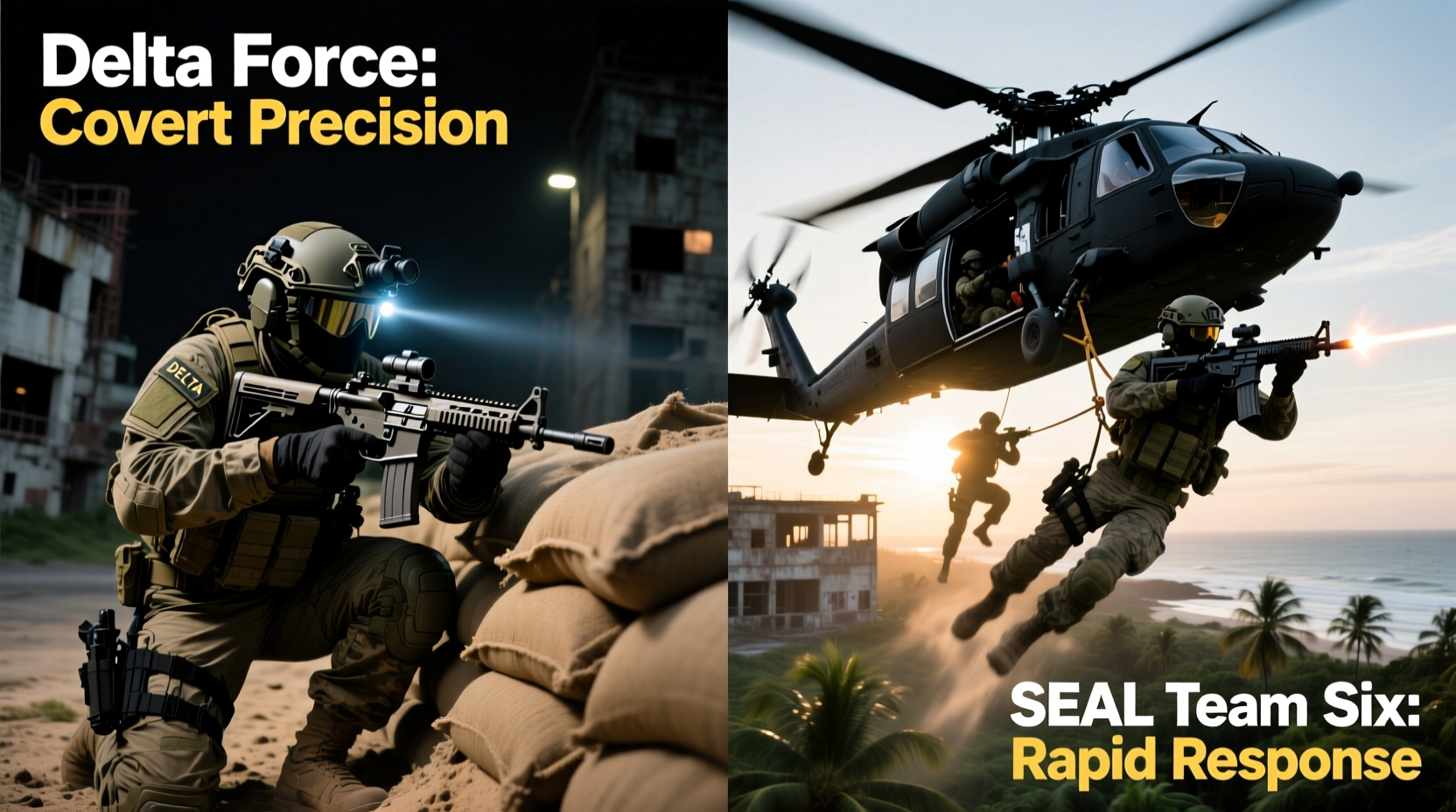The United States military houses some of the most elite special operations forces in the world. Among them, Delta Force and SEAL Team 6 stand out not only for their operational excellence but also for their starkly different levels of public recognition. Despite performing missions of equal gravity and risk, SEAL Team 6 enjoys far greater fame than Delta Force. This disparity raises a compelling question: why?
The answer lies not in capability or effectiveness—both units are among the most skilled tactical teams globally—but in a combination of historical context, media portrayal, strategic transparency, and cultural storytelling. Understanding this distinction reveals how reputation is shaped as much by narrative as by action.
Origins and Institutional Backing

Delta Force, officially known as 1st Special Forces Operational Detachment-Delta (1st SFOD-D), was established in 1977 by Colonel Charles Beckwith. It was created in response to growing global terrorism and the need for a dedicated counter-terrorism unit within the U.S. Army. Modeled after the British SAS, Delta operates under Joint Special Operations Command (JSOC) and focuses on hostage rescue, direct action, and high-value target elimination.
SEAL Team 6, formally designated as the Naval Special Warfare Development Group (DEVGRU), was founded in 1980 by Richard Marcinko following failures in Operation Eagle Claw. Like Delta, it falls under JSOC and specializes in maritime counter-terrorism, special reconnaissance, and anti-piracy operations. Both units were born from similar motivations—national security gaps exposed by failed missions—and operate at the pinnacle of military skill.
Yet their institutional homes have influenced their visibility. The Navy has historically allowed more controlled exposure of its SEALs through documentaries, memoirs, and recruitment campaigns. The Army, by contrast, has maintained a stricter culture of operational secrecy around Delta Force, rarely acknowledging its existence officially.
Media Exposure and Cultural Impact
No event elevated SEAL Team 6’s public profile more than the 2011 raid that killed Osama bin Laden. Codenamed Operation Neptune Spear, the mission was executed with precision and became a defining moment in modern military history. While the Pentagon never explicitly confirmed DEVGRU’s involvement, widespread reporting, leaks, and subsequent memoirs—most notably Mark Owen’s *No Easy Day*—cemented SEAL Team 6 in the public consciousness.
In contrast, Delta Force has been involved in equally significant operations—the 1980 Iranian Embassy siege support, the 1993 Battle of Mogadishu (Black Hawk Down), and numerous classified raids in Iraq and Afghanistan—yet none have received comparable media attention. Part of this stems from the Army’s tighter control over information and fewer authorized disclosures from former operators.
Hollywood has also played a role. Films like *Zero Dark Thirty*, *Act of Valor*, and video games such as *Call of Duty: Modern Warfare* prominently feature SEAL Team 6 operatives, often dramatizing their actions. Delta Force appears less frequently, and when it does, it's often fictionalized or inaccurately portrayed, diluting its real-world identity.
Transparency and Controlled Leaks
While both units operate under intense secrecy, the Navy has permitted a calculated level of transparency regarding DEVGRU. Senior officials have subtly acknowledged its role in key events, and retired members have published accounts with Pentagon approval. These narratives, while redacted, provide enough detail to build public mystique without compromising security.
The Army, particularly through U.S. Special Operations Command (USSOCOM), has consistently resisted similar openness for Delta Force. Former Delta operators who attempt to publish memoirs face extensive review processes, legal challenges, or outright suppression. This policy preserves operational integrity but limits public awareness.
“Delta doesn’t seek credit. In fact, we’re trained to vanish after the mission. That ethos runs deep.” — Retired Delta Operator, speaking anonymously to *Military Times*
This cultural commitment to invisibility reinforces Delta’s obscurity. Their successes are buried in classified reports, while SEAL Team 6’s exploits, though equally covert, have been selectively revealed to serve national morale and strategic messaging.
Comparative Visibility: A Summary Table
| Factor | Delta Force | SEAL Team 6 (DEVGRU) |
|---|---|---|
| Official Recognition | Rarely acknowledged | Occasionally referenced |
| Public Memoirs | Few, heavily censored | Multiple bestsellers (e.g., *No Easy Day*) |
| Hollywood Representation | Limited, often inaccurate | Frequent, high-profile portrayals |
| Key Public Mission | Mogadishu (1993) – mixed outcome | Bin Laden raid (2011) – decisive success |
| Recruitment Influence | Minimal public branding | Strong brand boosts SEAL recruitment |
The Role of Narrative in Elite Unit Fame
Fame in the world of special operations is not earned solely through performance—it is constructed through story. SEAL Team 6 benefited from a perfect storm: a globally recognized target, a successful nighttime raid, and a U.S. government willing to allow selective details to emerge. The image of Navy SEALs descending into Abbottabad became symbolic of American resolve.
Delta Force, despite conducting hundreds of high-risk missions across decades, lacks a single defining public moment. The Black Hawk Down incident, while widely known, ended in controversy and loss, overshadowing the valor displayed. Without a clear, heroic narrative anchor, Delta remains legendary within military circles but obscure to the general public.
Moreover, the Navy SEAL community is larger and more visible overall. Basic SEAL training (BUD/S) is well-documented, and public figures like David Goggins have brought broader attention to the SEAL pipeline. Delta’s selection process, known as “Operator Assessment and Selection,” is shrouded in silence, further distancing it from popular understanding.
Mini Case Study: The Bin Laden Raid and Its Aftermath
On May 2, 2011, a team of DEVGRU operators infiltrated a compound in Abbottabad, Pakistan, and eliminated Osama bin Laden, the mastermind behind the 9/11 attacks. Within days, news outlets worldwide credited “SEAL Team 6” with the operation. Though the White House avoided naming the unit directly, President Obama’s description matched DEVGRU’s capabilities exactly.
In the months that followed, books emerged, documentaries aired, and even a feature film (*Zero Dark Thirty*) dramatized the intelligence buildup and raid. The operators themselves remained anonymous, but the unit’s name became synonymous with elite precision. Recruitment to Naval Special Warfare saw a measurable uptick.
In contrast, Delta Force conducted a similarly complex raid in 2003 to capture Saddam Hussein (Operation Red Dawn). Despite its success, the mission was attributed to conventional forces initially, and Delta’s role was only confirmed years later through insider accounts. No major film, book, or media campaign highlighted their contribution.
Frequently Asked Questions
Are Delta Force and SEAL Team 6 the same tier of unit?
Yes. Both are Tier 1 special mission units under JSOC, reserved for the most sensitive and high-risk operations. They undergo comparable selection rigor and train to the highest combat standards.
Can Delta Force operators join SEAL Team 6 or vice versa?
Rarely, but possible. Cross-branch transfers are uncommon due to service loyalty, specialized training pipelines, and security protocols. However, joint training exercises do occur in classified environments.
Why don’t we hear more about Delta Force missions?
Delta Force operates under stricter information control policies. The Army prioritizes operational secrecy over public recognition, and former members face significant hurdles in sharing their experiences.
Actionable Insights for Understanding Elite Units
- Recognize that fame does not reflect capability—both units are equally elite.
- Follow official military releases and reputable defense journalists for accurate updates.
- Be skeptical of sensationalized media portrayals of either unit.
- Understand that secrecy is a tactical advantage, not a sign of lesser importance.
- Support veterans’ organizations that assist special operations personnel, regardless of public visibility.
Conclusion: Legacy Beyond the Spotlight
The difference in fame between Delta Force and SEAL Team 6 is not a measure of skill, courage, or impact—it is a product of timing, narrative control, and institutional approach to public engagement. SEAL Team 6’s prominence stems from a confluence of historical circumstance and managed visibility, while Delta Force’s anonymity is by design, rooted in a doctrine of quiet effectiveness.
Both units exemplify the pinnacle of military professionalism, operating where failure is not an option. Their true legacy isn’t found in headlines or Hollywood scripts, but in the countless missions completed in silence, protecting national security without fanfare.









 浙公网安备
33010002000092号
浙公网安备
33010002000092号 浙B2-20120091-4
浙B2-20120091-4
Comments
No comments yet. Why don't you start the discussion?